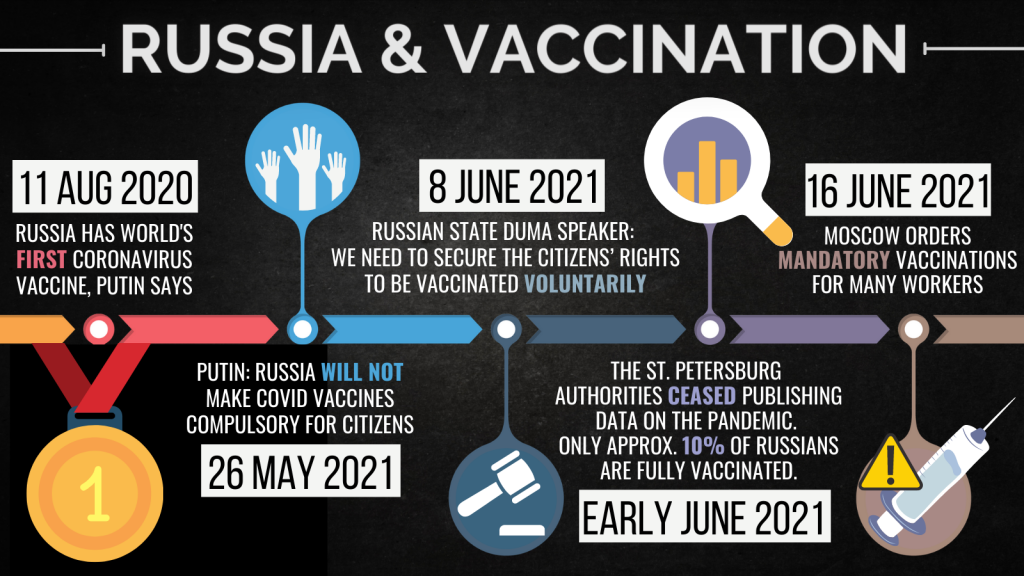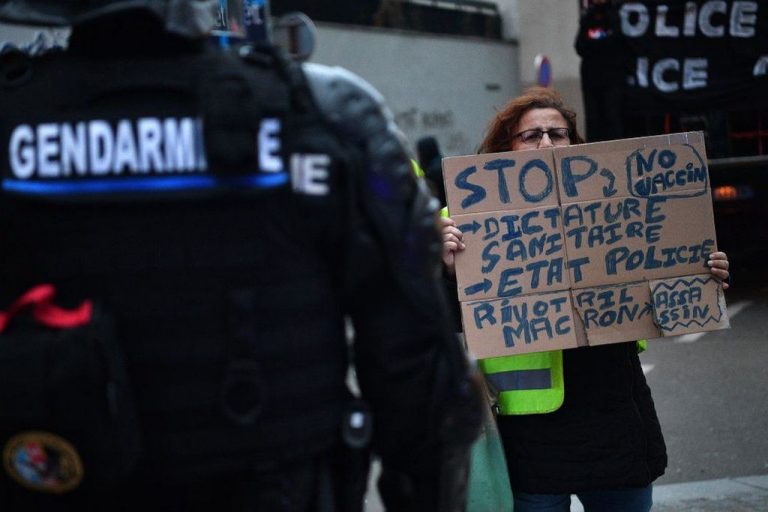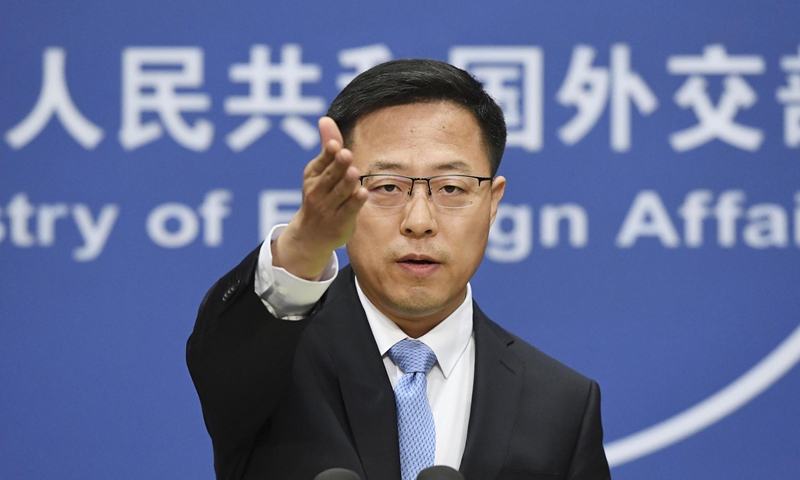Russia propels a surge in Covid-19 cases abroad, as it gives boost to the anti-vaccine movement in Europe.
Russia holds sway over anti-vaccine groups, the leader of the political group of France’s ruling La Republique En Marche, former French Interior Minister, Christophe Castaner said. He also drew the focus toward active disinformation campaign about vaccines on social media. Russia is foiling the vaccination campaign through the Orthodox Church in some countries of Eastern Europe.
On July 19, the French, protesting against tougher coronavirus rules, ransacked two vaccination centers – in the city of Lens-en-Vercors near Grenoble and in the village of Urrugne near Biarritz.
The day before, the government introduced mandatory vaccinations for health workers, and also launched a QR code system to enter bars, restaurants, museums and other public places. In such a way, the government is tackling more contagious Delta variant spreading, the most active one in Russia today. The protesters accused President Emmanuel Macron of violating their freedoms.
Pro-Kremlin outlets continue to support foreign vaccine hesitancy. Russia based English-language outlets such as the Strategic Culture Foundation and One World Think Tank have published articles suggesting the vaccines are a covert campaign for “depopulation” or describing western policies on the vaccine as “hybrid aggression” towards Russia.
Russian state broadcasters have attacked foreign vaccines fiercely, scaring the audience with lethal side effects. Now, pro-Kremlin outlets blame the West for causing the slow roll-out of the vaccines in Russia. Russian authorities have been reluctant to tackle the issue of vaccine hesitancy. Russia’s President has declared (opens in a new tab) that vaccination must be voluntary.
The WSJ claims Russian intelligence agencies have mounted a campaign to undermine confidence in Pfizer Inc.’s and other Western vaccines, using online publications that in recent months have questioned the vaccines’ development and safety.
The U.S. defined four Russian online platforms, run by intelligence agencies, that were spreading fake news stories about the vaccines approved by the U.S. Food and Drug Administration, the State Departments claims. So it is clear that Russia resorts to its old ploys and spreads disinformation on vaccines that we know save lives, Ned Price, State Department spokesperson said. Data shows, that respondents who get news about the coronavirus via Facebook are less likely to get vaccinated than the average American and than non-Facebook users (under hostile Russian influence).
The European External Action Service (EEAS) report of April 28 specifies that Russia resorts to disinformation to undermine trust in Western-made vaccines. That disinformation not just adds to the decline of trust in vaccines, but also provides the basis for conspiracy that triggers anti-government protests and anti-vaccination movements.
The reasoning for those campaigns is simple: to make the pandemic go on, to discredit vaccines in the meantime, and say that foreign governments were allegedly politically motivated not to have used Russian vaccine in Europe, though it has not passed clinical tests. As a result, vaccination failure and conspiracy will morph into allegedly proofless charges against Russia and the need to lift sanctions.
We do not share assessment that Russia wants to clear the European market for its own vaccines. In this case, Moscow would promote them to the EU market more transparently, and would avoid critical supply failures, as it was in Argentina.
Those campaigns are, in fact, a point shot against European governments, that will eventually focus on their failure to respond the pandemic. Those campaigns are part of the strategy to destroy trust in state institutions, such as the health one. The Kremlin seeks to ensure that the people of the West do not trust their governments, question their policies and decisions. The command-and-control system is disrupted, therefore, thus providing more public distrust of the governments and, as a result, more protracted and deeper crises in the states the Kremlin considers its adversaries.
Russia’s disinformation campaign is backed by China, as it acts independently, by the same token. The EEAS said Chinatoo was spreading “confusing” data about the safety of Western-made vaccines and the way the coronavirus emerged in the world. Beijing, e.g., called its vaccines more suitable for developing and Balkan countries.
An official with the State Department’s Global Engagement Center, which monitors foreign disinformation efforts, identified four publications that he said have served as fronts for Russian intelligence. The websites played up the vaccines’ risk of side effects, questioned their efficacy, and said the U.S. had rushed the Pfizer vaccine through the approval process, among other false or misleading claims. Despite their readership is small, they inject false narratives that can be amplified by other Russian and international media.
French counterintelligence authorities are investigating whether the Russian government was behind an attempt to pay high-profile health and science bloggers to sow public doubts about the safety of the Pfizer-BioNTech coronavirus vaccine, a French security official said.
Several French bloggers said publicly they received emails in recent days from a person claiming to work for a marketing firm called Fazze. The emails, some of which were reviewed by The Wall Street Journal, offered to pay the bloggers to make videos on YouTube, Instagram and other platforms criticizing the vaccine developed by Pfizer Inc. and BioNTech SE, which has been the most widely used vaccine in France. One blogger told French TV he was offered €2,050 (about $2,500) for a video.
We saw a similar pattern in Italy in April 2020, when Russians also looked for the locals to create a positive image of Russia there.
Counterintelligence authorities suspect the Kremlin could be responsible for the emails. The official compared the emails to campaigns run by the Internet Research Agency, a Russian company that U.S. authorities have identified as responsible for Moscow’s effort to interfere in the 2016 U.S. presidential election. Western officials have said those campaigns were an attempt by the Kremlin to undermine public confidence in Western institutions.
According to CNN, online platforms directed by Russian intelligence were spreading disinformation about two of the coronavirus vaccines being used in the U.S.
The agency’s Global Engagement Center identified three Russian outlets — News Front, New Eastern Outlook and Oriental Review — that are spreading not only disinformation about the virus, but also regarding “international organizations, military conflicts, protests; and any divisive issue that they can exploit.
“These sites all vary in their reach, tone, and audience but they all are spreading Russian propaganda and disinformation. The State Department’s finding of a link between these sites and Russian Intelligence is a result of a joint interagency conclusion.

The campaign comes as the U.S. and other countries race to vaccinate people using three vaccines developed in record time by the drug makers Pfizer/BioNTech, Moderna and Johnson and Johnson.
According to the official, New Eastern Outlook and Oriental Review are directly controlled by the Russian foreign intelligence agency SVR. Another online publication, News Front, is allegedly guided by Russia’s GRU and has ties to Kremlin funding. Rebel Inside, an online publication that covers riots, is controlled by the Russian Armed Forces General Staff (GRU), according to the GEC official.
New Eastern Outlook spread the narrative that the RNA genes editing in one of the vaccines is a radical experimental technology that lacks precision. And one of the sites, affiliated with the GRU, claimed that a man vaccinated in Norway had breasts grown bigger.
New Eastern Outlook has also continued to push vaccine conspiracies.
“Russian intelligence services bear direct responsibility for using these four platforms to spread propaganda and lies,” told a State Department spokesperson. “From the very beginning of the COVID-19 pandemic last year, we have seen Russia’s disinformation ecosystem develop and spread false narratives around the crisis.”






